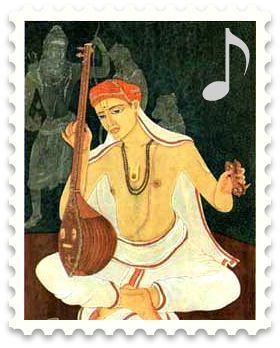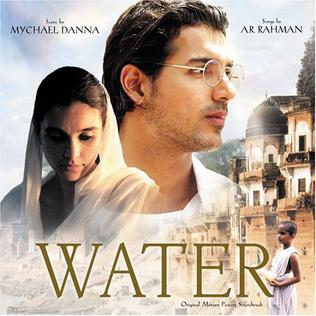Related Research Articles

Floating Point is an album by John McLaughlin, released in 2008 through the record label Abstract Logix. The album reached number fourteen on Billboard's Top Jazz Albums chart.

Owing to India's vastness and diversity, Indian music encompasses numerous genres in multiple varieties and forms which include classical music, folk, rock, and pop. It has a history spanning several millennia and developed over several geo-locations spanning the sub-continent. Music in India began as an integral part of socio-religious life.
Hindustani classical music is the classical music of the Indian subcontinent's northern regions. It may also be called North Indian classical music or, in Hindustani, shastriya sangeet. The term shastriya sangeet literally means classical music, and is also used to refer to Indian classical music in general. It is played on instruments like the veena, sitar and sarod. Its origins from the 12th century CE, when it diverged from Carnatic music, the classical tradition in South India. While Carnatic music largely uses compositions written in Sanskrit, Kannada, Telugu, Tamil, Malayalam, Hindustani music largely uses compositions written in Hindi-Urdu, Braj, Avadhi, Punjabi, and Rajasthani,.

The music of Suriname is known for kaseko music, and for having an Indo-Caribbean tradition.

Raga rock is rock or pop music with a pronounced Indian influence, either in its construction, its timbre, or its use of Indian musical instruments, such as the sitar, tambura, and tabla. The term "raga" refers to the specific melodic modes used in Indian classical music.

Pandit Bhajan Sopori was an Indian instrumentalist. He was a player of the santoor, an ancient stringed musical instrument.

Caribbean Hindustani is an Indo-Aryan language spoken by Indo-Caribbeans and the Indo-Caribbean diaspora. It is a koiné language mainly based on the Bhojpuri and Awadhi dialects. These Hindustani dialects were the most spoken dialects by the Indians who came as immigrants to the Caribbean from Colonial India as indentured laborers. It is closely related to Fiji Hindi and the Bhojpuri-Hindustani spoken in Mauritius and South Africa.
The history of the sitar in jazz, that is the fusion of the sounds of Indian classical music with Western jazz, dates back from the late-1950s or early-1960s when musicians trained in Indian classical music such as Ravi Shankar started collaborating with jazz musicians such as Tony Scott and Bud Shank. Later jazz recordings containing sitar music include albums by Miles Davis, Alice Coltrane, Yusef Lateef, Joe Harriott ,and Ornette Coleman.
Kailasa is an Indian fusion band, founded by Kailash Kher. The name of the band is taken from an accented pronunciation of Kailash's own name as well as Mount Kailash, the abode of Hindu God Shiva. Along with guitars, drums and keyboards, the band incorporates classical Indian instruments and sometimes traditional lyrics into their songs to infuse folk and a Sufi hue.

Prem Joshua is a German musician, active since 1969.

Ashwin Kumar Batish Hindi: अश्विन कुमार बातिश is an Indian sitar and tabla player.

John Henry Basil Mayer was an Indian composer known primarily for his fusions of jazz with Indian music in the British-based group Indo-Jazz Fusions with the Jamaican-born saxophonist Joe Harriott.

Water is the soundtrack to the 2005 film of the same name. It was released on 20 December 2005 by labels Sony BMG in India and Varèse Sarabande internationally. The songs were composed by A. R. Rahman and the background score of the film was composed by Mychael Danna.
Harihar Rao was an Indian-born American musician, noted for playing tabla and sitar.

Shankar Tucker is an American clarinetist and music composer. He rose to fame with the popularity of his YouTube music channel "The ShrutiBox".

In Concert 1972 is a double live album by sitar virtuoso Ravi Shankar and sarodiya Ali Akbar Khan, released in 1973 on Apple Records. It was recorded at the Philharmonic Hall, New York City, in October 1972, and is a noted example of the two Hindustani classical musicians' celebrated jugalbandi (duet) style of playing. With accompaniment from tabla player Alla Rakha, the performance reflects the two artists' sorrow at the recent death of their revered guru, and Khan's father, Allauddin Khan. The latter was responsible for many innovations in Indian music during the twentieth century, including the call-and-response dialogue that musicians such as Shankar, Khan and Rakha popularised among Western audiences in the 1960s.
Padmaja Phenany Joglekar is a Hindustani Classical singer. She is a disciple of Pandit Jasraj. She was awarded the Padma Shri Award in 2001.

West Meets East is an album by American violinist Yehudi Menuhin and Indian sitar virtuoso Ravi Shankar, released in Britain in January 1967. It was recorded following their successful duet in June 1966 at the Bath Musical Festival, where they had played some of the same material.

Ravi Shankar: In Celebration is a compilation box set by Indian classical musician and composer Ravi Shankar, released in 1996 on Angel Records in conjunction with Dark Horse Records. The four discs cover Shankar's international career, from the 1950s to the mid 1990s, and include recordings originally released on the World Pacific, HMV, Angel, Apple, Dark Horse and Private Music record labels. Shankar's friend George Harrison compiled and co-produced the set, which was issued as part of year-long celebrations for Shankar's 75th birthday.

Ravi Shankar's Festival from India is a double album by Indian musician and composer Ravi Shankar, released on World Pacific Records in December 1968. It contains studio recordings made by a large ensemble of performers, many of whom Shankar had brought to the United States from India. Among the musicians were Shivkumar Sharma, Jitendra Abhisheki, Palghat Raghu, Lakshmi Shankar, Aashish Khan and Alla Rakha. The project presented Indian classical music in an orchestral setting, so recalling Shankar's work as musical director of All India Radio in the years before he achieved international fame as a soloist during the 1960s.
References
- ↑ The Hindu : Tamil Nadu / Chennai News : Wait for fusion music full of surprises
- ↑ Hale, Christopher Dicran (2015). Dueck, Jonathan; Reily, Suzel Ana (eds.). Are Western Christian Bhajans "Reverse" Mission Music?. doi:10.1093/oxfordhb/9780199859993.013.10. ISBN 978-0-19-985999-3.
- ↑ "East and West || Aradhna". Archived from the original on 2008-08-03. Retrieved 2008-01-29.
- ↑ Colossians Three Sixteen » Amrit Vani (Album Review) Archived March 30, 2008, at the Wayback Machine
- ↑ Reviews of The Phantom Tollbooth